-人教版(2019)必修第三册Unit 2 Morals and Virtues Reading and Thinking 课文逐句翻译课件(共34张PPT)
文档属性
| 名称 | -人教版(2019)必修第三册Unit 2 Morals and Virtues Reading and Thinking 课文逐句翻译课件(共34张PPT) | 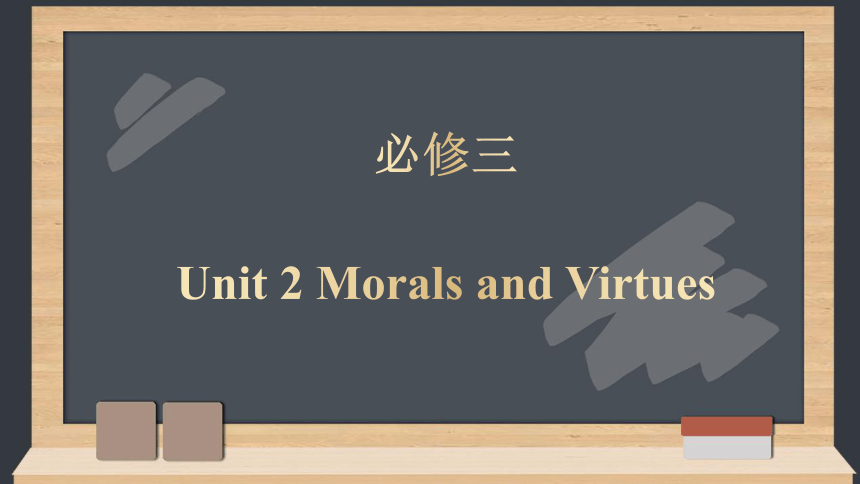 | |
| 格式 | pptx | ||
| 文件大小 | 12.6MB | ||
| 资源类型 | 教案 | ||
| 版本资源 | 人教版(2019) | ||
| 科目 | 英语 | ||
| 更新时间 | 2024-05-20 15:25:01 | ||
图片预览

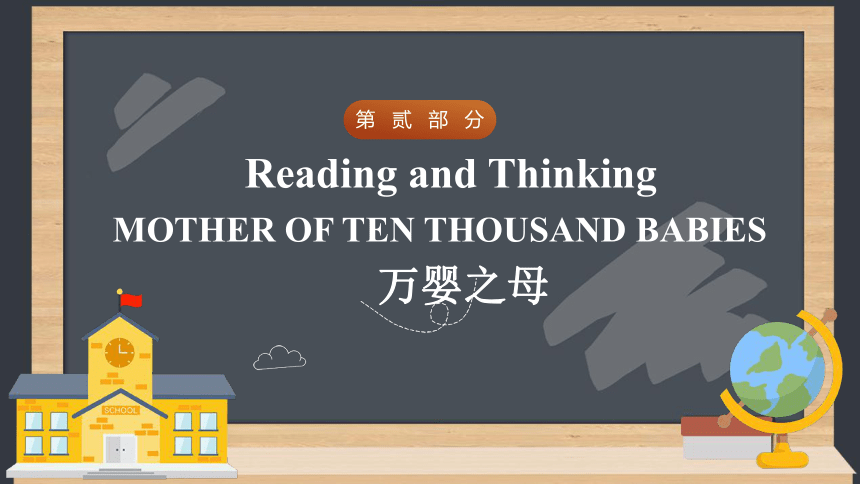
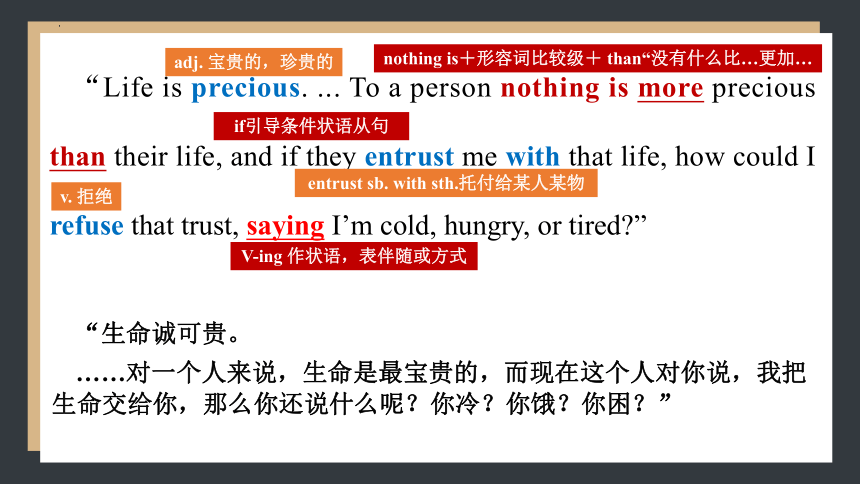
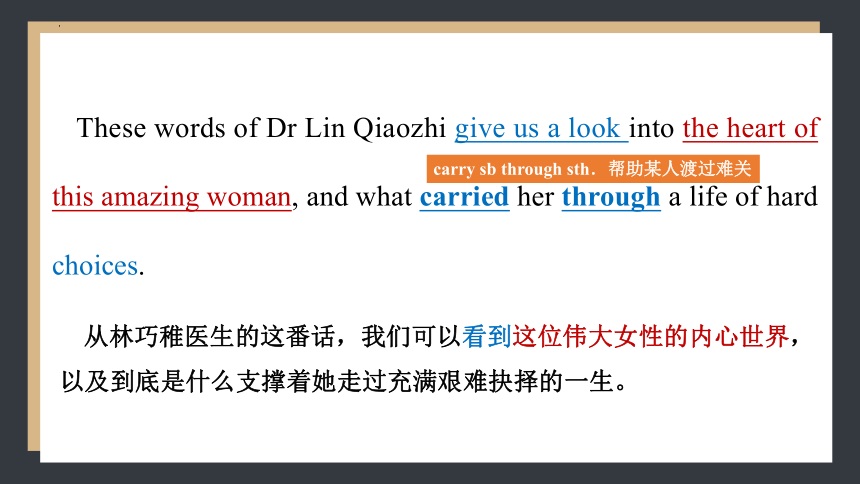
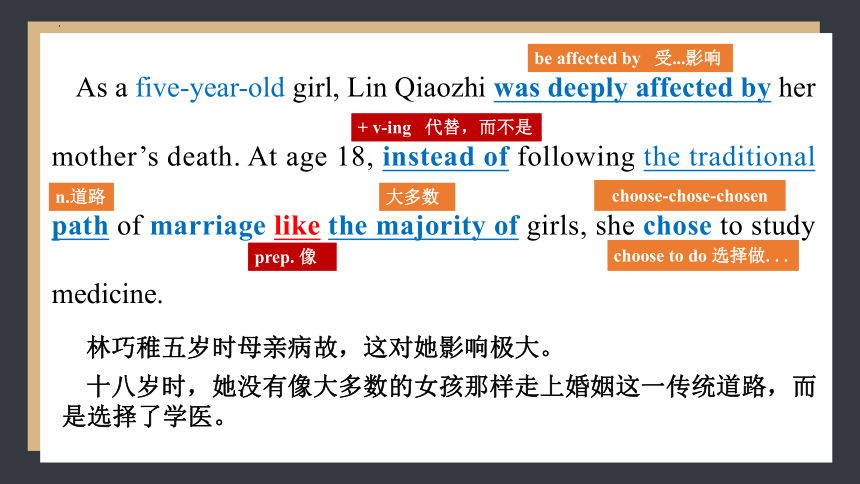
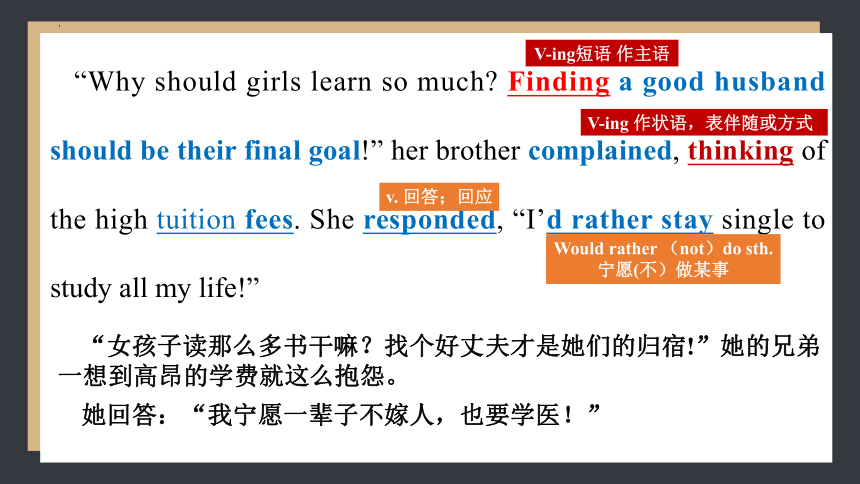
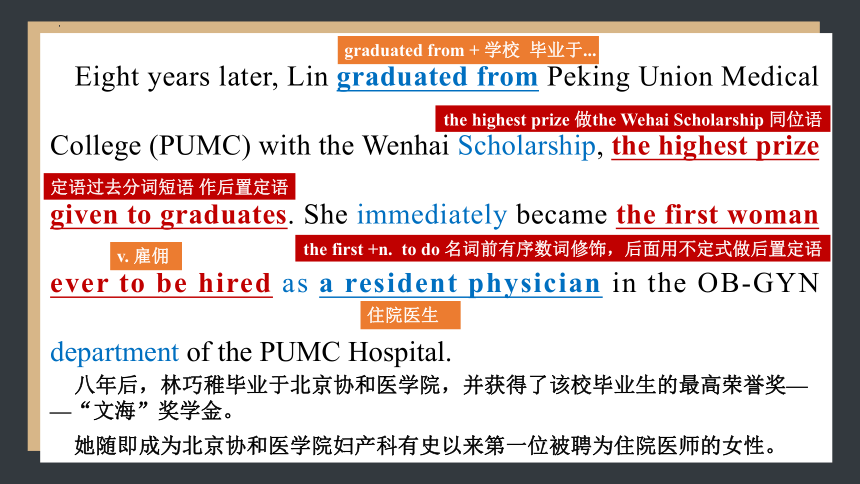
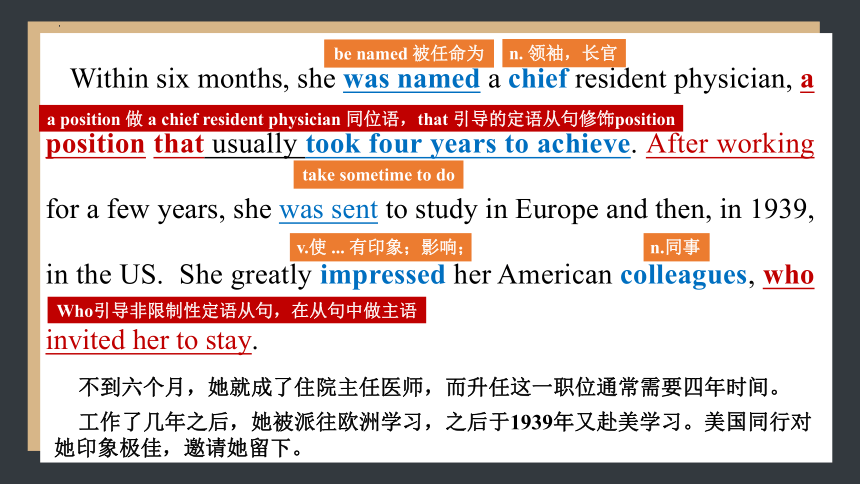
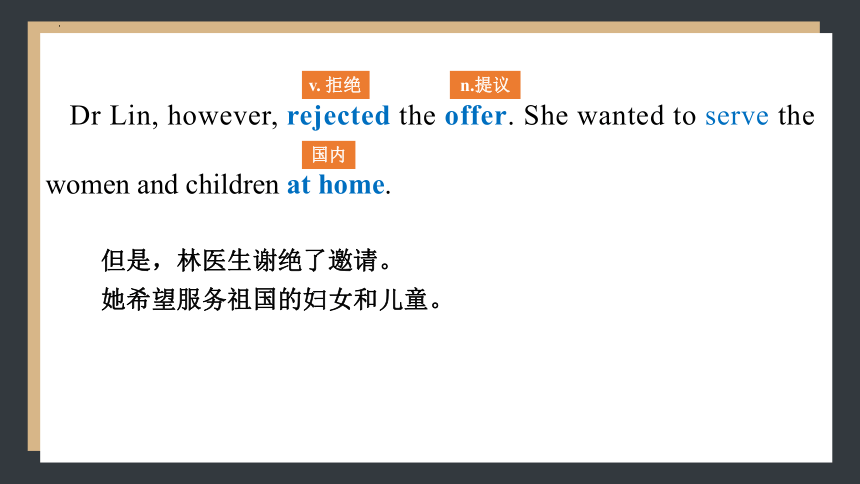
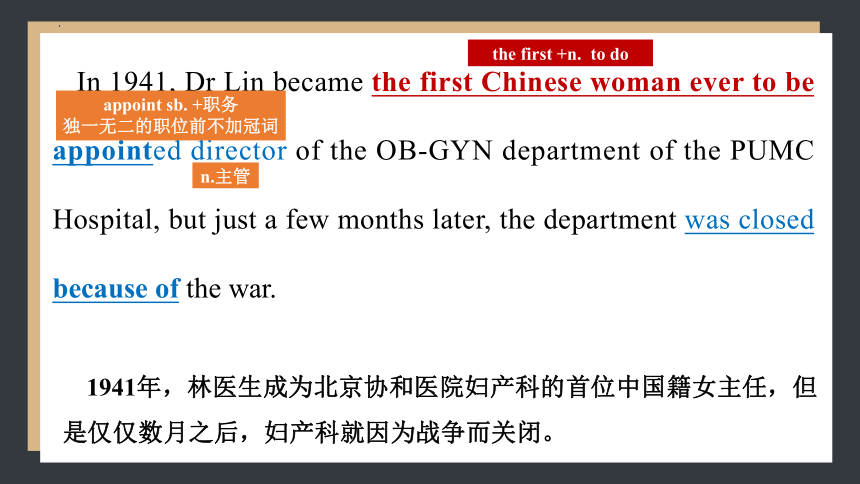
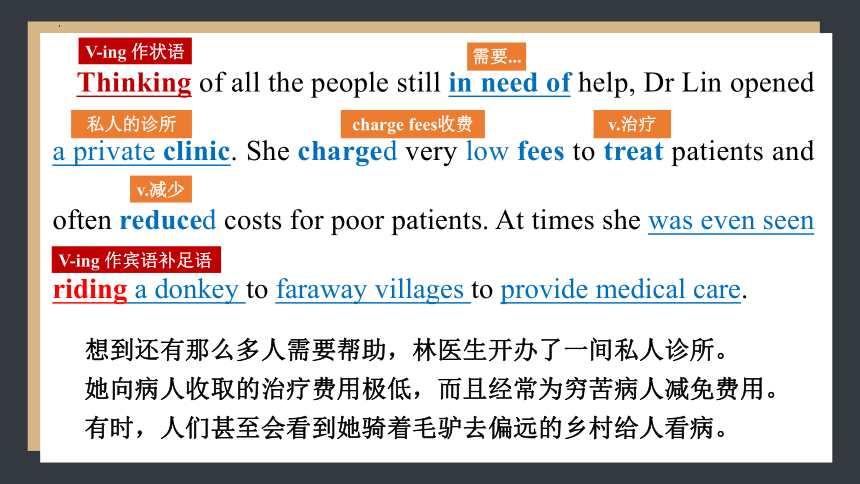

文档简介
(共34张PPT)
必修三
Unit 2 Morals and Virtues
Reading and Thinking
MOTHER OF TEN THOUSAND BABIES
万婴之母
第贰部分
“Life is precious. ... To a person nothing is more precious than their life, and if they entrust me with that life, how could I refuse that trust, saying I’m cold, hungry, or tired ”
“生命诚可贵。
……对一个人来说,生命是最宝贵的,而现在这个人对你说,我把生命交给你,那么你还说什么呢?你冷?你饿?你困?”
entrust sb. with sth.托付给某人某物
adj. 宝贵的,珍贵的
v. 拒绝
nothing is+形容词比较级+ than“没有什么比…更加…
if引导条件状语从句
V-ing 作状语,表伴随或方式
These words of Dr Lin Qiaozhi give us a look into the heart of this amazing woman, and what carried her through a life of hard choices.
从林巧稚医生的这番话,我们可以看到这位伟大女性的内心世界,以及到底是什么支撑着她走过充满艰难抉择的一生。
carry sb through sth.帮助某人渡过难关
As a five-year-old girl, Lin Qiaozhi was deeply affected by her mother’s death. At age 18, instead of following the traditional path of marriage like the majority of girls, she chose to study medicine.
林巧稚五岁时母亲病故,这对她影响极大。
十八岁时,她没有像大多数的女孩那样走上婚姻这一传统道路,而是选择了学医。
be affected by 受...影响
n.道路
大多数
+ v-ing 代替,而不是
choose-chose-chosen
choose to do 选择做...
prep. 像
“Why should girls learn so much Finding a good husband should be their final goal!” her brother complained, thinking of the high tuition fees. She responded, “I’d rather stay single to study all my life!”
“女孩子读那么多书干嘛?找个好丈夫才是她们的归宿!”她的兄弟一想到高昂的学费就这么抱怨。
她回答:“我宁愿一辈子不嫁人,也要学医!”
V-ing短语 作主语
V-ing 作状语,表伴随或方式
v. 回答;回应
Would rather (not)do sth.
宁愿(不)做某事
Eight years later, Lin graduated from Peking Union Medical College (PUMC) with the Wenhai Scholarship, the highest prize given to graduates. She immediately became the first woman ever to be hired as a resident physician in the OB-GYN department of the PUMC Hospital.
八年后,林巧稚毕业于北京协和医学院,并获得了该校毕业生的最高荣誉奖——“文海”奖学金。
她随即成为北京协和医学院妇产科有史以来第一位被聘为住院医师的女性。
graduated from + 学校 毕业于...
定语过去分词短语 作后置定语
the highest prize 做the Wehai Scholarship 同位语
v. 雇佣
the first +n. to do 名词前有序数词修饰,后面用不定式做后置定语
住院医生
不到六个月,她就成了住院主任医师,而升任这一职位通常需要四年时间。
工作了几年之后,她被派往欧洲学习,之后于1939年又赴美学习。美国同行对她印象极佳,邀请她留下。
Within six months, she was named a chief resident physician, a position that usually took four years to achieve. After working for a few years, she was sent to study in Europe and then, in 1939, in the US. She greatly impressed her American colleagues, who invited her to stay.
n. 领袖,长官
v.使 ... 有印象;影响;
n.同事
be named 被任命为
a position 做 a chief resident physician 同位语,that 引导的定语从句修饰position
take sometime to do
Who引导非限制性定语从句,在从句中做主语
但是,林医生谢绝了邀请。
她希望服务祖国的妇女和儿童。
Dr Lin, however, rejected the offer. She wanted to serve the women and children at home.
v. 拒绝
n.提议
国内
In 1941, Dr Lin became the first Chinese woman ever to be appointed director of the OB-GYN department of the PUMC Hospital, but just a few months later, the department was closed because of the war.
1941年,林医生成为北京协和医院妇产科的首位中国籍女主任,但是仅仅数月之后,妇产科就因为战争而关闭。
n.主管
the first +n. to do
appoint sb. +职务
独一无二的职位前不加冠词
Thinking of all the people still in need of help, Dr Lin opened a private clinic. She charged very low fees to treat patients and often reduced costs for poor patients. At times she was even seen riding a donkey to faraway villages to provide medical care.
想到还有那么多人需要帮助,林医生开办了一间私人诊所。
她向病人收取的治疗费用极低,而且经常为穷苦病人减免费用。
有时,人们甚至会看到她骑着毛驴去偏远的乡村给人看病。
v.减少
V-ing 作状语
需要...
私人的诊所
charge fees收费
v.治疗
V-ing 作宾语补足语
The new People’s Republic of China saw Dr Lin Qiaozhi playing a key role. In 1954, she was elected to the first National People’s Congress and, over the next several decades, she held many important positions.
中华人民共和国成立后,林巧稚医生发挥了重要作用。
1954年,她当选第一届全国人大代表; 在随后的几十年间,她担任许多重要职位。
十年
人民代表大会
see + 宾语 + 宾补 v-ing作宾语补足语
起关键作用,扮演重要角色
v. 担任
v.选举
Her heart, however, was elsewhere. She was more interested in tending patients, publishing medical research on care for women and children, and training the next generation of doctors.
然而,她的心却在别处。
她更感兴趣的是照顾病人,发表关于妇女儿童的医学调查、以及培养下一代的医生。
v.照顾
v.出版
tending,publishing,training作介词in的宾语
care for:①照顾;照料
② 深深地爱;非常喜欢
“The OB-GYN department cares for two lives,” She told new staff in her department. “As doctors, we should be responsible for the patients and treat them as our sisters.”
“妇产科关注的是两条生命”,她告诉自己科室新入职的职员。
“作为医生,我们必须对病人负责,并视她们为姐妹。”
n.全体职员
对…负责
把…视为…
Though Lin Qiaozhi never married, she was known as the “mother of ten thousand babies”, having delivered over 50,000 babies in her lifetime. Dr Lin did not retire until the day she died, 22 April 1983.
虽然林巧稚终身未婚,但是她被称为“万婴之母”,她一生中亲手接生的婴儿有五万多名。
林医生坚守在岗位上,直到1983年4月22日她去世的那一天。
v.接生,生(孩子),发表(演讲),
v.退休
though引导让步状语从句
be known as 被称作...,以…著称
be known for 因为...而著名
现在分词完成时作状语,起补充说明的作用,
表示分词的动作发生在主句谓语动词之前。
否定形式为:not having done
直到…才
Since she had no children of her own, she left her savings to a kindergarten and a fund for new doctors. And even as she lay dying, her final thoughts were for others. “I’m ready to go,” she said. “Don’t try to rescue me any more. Don’t waste the medicine any more.”
由于自己没有孩子,她把积蓄捐给了一家幼儿园和一项新医生基金。
临终时,她仍在为别人着想。
“我要走了,”她说,“不要再抢救了,不要再浪费药品了。”
of one’s own 某人自己的
n. 想法;观念;思想
vt.救援,营救
since引导原因状语从句
as引导时间状语从句
lie/ be dying 弥留之际
lie:处于,保留,保持be(某种状态)
n.存款
“Life is precious. ... To a person nothing is more precious than their life, and if they entrust me with that life, how could I refuse that trust, saying I’m cold, hungry, or tired ” These words of Dr Lin Qiaozhi give us a look into the heart of this amazing woman, and what carried her through a life of hard choices.
As a five-year-old girl, Lin Qiaozhi was deeply affected by her mother’s death. At age 18, instead of following the traditional path of marriage like the majority of girls, she chose to study medicine. “Why should girls learn so much Finding a good husband should be their final goal!” her brother complained, thinking of the high tuition fees. She responded, “I’d rather stay single to study all my life!”
“生命诚可贵。……对一个人来说,生命是最宝贵的,而现在这个人对你说,我把生命交给你,那么你还说什么呢?你冷?你饿?你困?”从林巧稚医生的这番话,我们可以看到这位伟大女性的内心世界,以及到底是什么支撑着她走过充满艰难抉择的一生。
林巧稚五岁时母亲病故,这对她影响极大。十八岁时,她没有像大多数的女孩那样走上婚姻这一传统道路,而是选择了学医。“女孩子读那么多书干嘛?找个好丈夫才是她们的归宿!”她的兄弟一想到高昂的学费就这么抱怨。她回答:“我宁愿一辈子不嫁人,也要学医!”
Eight years later, Lin graduated from Peking Union Medical College (PUMC) with the Wehai Scholarship, the highest prize given to graduates. She immediately became the first woman ever to be hired as a resident physician in the OB-GYN department of the PUMC Hospital. Within six months, she was named a chief resident physician, a position that usually took four years to achieve. After working for a few years, she was sent to study in Europe and then, in 1939, in the US. She greatly impressed her American colleagues, who invited her to stay. Dr Lin, however, rejected the offer. She wanted to serve the women and children at home.
In 1941, Dr Lin became the first Chinese woman ever to be appointed director of the OB-GYN department of the PUMC Hospital, but just a few months later, the department was closed because of the war. Thinking of all the people still in need of help, Dr Lin opened a private clinic. She charged very low fees to treat patients and often reduced costs for poor patients. At times she was even seen riding a donkey to faraway villages to provide medical care.
八年后,林巧稚毕业于北京协和医学院,并获得了该校毕业生的最高荣誉奖--“文海”奖学金。她随即成为北京协和医学院妇产科有史以来第一位被聘为住院医师的女性。不到六个月,她就成了住院主任医师,而升任这一职位通常需要四年时间。工作了几年之后,她被派往欧洲学习,之后于1939年又赴美学习。美国同行对她印象极佳,邀请她留下。但是,林医生谢绝了邀请。她希望服务祖国的妇女和儿童。
1941年,林医生成为北京协和医院妇产科的首位中国籍女主任,但是仅仅数月之后,妇产科就因为战争而关闭。想到还有那么多人需要帮助,林医生开办了一间私人诊所。她向病人收取的治疗费用极低,而且经常为穷苦病人减免费用。有时,人们甚至会看到她骑着毛驴去偏远的乡村给人看病。
The new People’s Republic of China saw Dr Lin Qiaozhi playing a key role. In 1954, she was elected to the first National People’s Congress and, over the next several decades, she held many important positions. Her heart, however, was elsewhere. She was more interested in tending patients, publishing medical research on care for women and children, and training the next generation of doctors. “The OB-GYN department cares for two lives,” She told new staff in her department. “As doctors, we should be responsible for the patients and treat them as our sisters.”
Though Lin Qiaozhi never married, she was known as the “mother of ten thousand babies”, having delivered over 50,000 babies in her lifetime. Dr Lin did not retire until the day she died, 22 April 1983. Since she had no children of her own, she left her savings to a kindergarten and a fund for new doctors. And even as she lay dying, her final thoughts were for others. “I’m ready to go,” she said, “Don’t try to rescue me any more. Don’t waste the medicine any more.”
中华人民共和国成立后,林巧稚医生发挥了重要作用。1954年,她当选第一届全国人大代表; 在随后的几十年间,她担任许多重要职位。然而,她的心却在别处。她更感兴趣的是照顾病人,发表关于妇女儿童的医学调查、以及培养下一代的医生。“妇产科关注的是两条生命”,她告诉自己科室新入职的职员。“作为医生,我们必须对病人负责,并视她们为姐妹。
虽然林巧稚终身未婚,但是她被称为“万婴之母”,她一生中亲手接生的婴儿有五万多名。林医生坚守在岗位上,直到1983年4月22日她去世的那一天。由于自己没有孩子,她把积蓄捐给了一家幼儿园和一项新医生基金。临终时,她仍在为别人着想。“我要走了,”她说,“不要再抢救了,不要再浪费药品了。”
对一个人来说,生命是最宝贵的,而现在这个人对你说,我把生命交给你,那么你还说什么呢?你冷?你饿?你困?”
我宁愿一辈子不嫁人,也要学医。
她随即成为有史以来第一位被聘为住院医师的女性。
不到六个月,她就成了住院主任医师,而升任这一职位通常需要四年时间。
有时,人们甚至会看到她骑着毛驴去偏远的乡村给人看病。
中华人民共和国成立后,林巧稚医生发挥了重要作用。
虽然林巧稚终身未婚,但是她被称为“万婴之母”,她一生中亲手接生的婴儿有五万多名。
临终时,她仍在为别人着想。
Reading for Writing
THE STONE IN THE ROAD
挡道的石头
第叁部分
THE STONE IN THE ROAD 挡道的石头
Once upon a time there was a king who often thought, “Nothing good can come to a nation whose people only complain and expect others to solve their problems.” One day, he had an idea.
从前有个国王,他经常思考:没有什么好事会发生在一个 ( 人们只会抱怨和期待别人来解决他们的问题的) 国家。有一天,他想到一个办法。
从前
v. 期望,希望
v. 解决,解答
who引导定语从句,修饰a king
whose引导定语从句
Early one morning, the king disguised himself and went to a local village. He placed a large stone in the middle of the main street and hid gold coins under the stone. Then he hid behind a huge maple tree and watched.
一天清晨,国王乔装打扮一番后,来到了当地的一座村庄。
他在主路中间放了一块大石头,并且在石头下面藏了几枚金币。
然后,他就躲在一棵大枫树后观察。
v. 装扮,假扮
v. 放置
adj.主要的
v. 躲藏 (hide-hid- hid/hidden)
The first person down the street was a milkman with his cart. He crashed into the stone, spilling the milk everywhere. “What fool put this stone here ” he shouted. He picked himself up and angrily went away.
路上走来的第一个人是推着车子的送奶工。
他撞到石头上,把牛奶泼得到处都是,
他大喊:“哪个傻瓜把石头放在这儿了?”
他从地上爬起来,气呼呼地走了。
n. 送牛奶的人
n. 手推车
crash into… 撞上…
v. 洒出
v-ing 做结果状语
n. 傻瓜
v. 大声叫
pick oneself up(跌倒后)站起来
After a while, a group of women came along, each balancing a pot of water on her head. One woman tripped over the stone and her water pot went crashing to the ground. She picked herself up and limped away in tears. Neither she nor her friends thought about moving the stone out of the road.
过了一会儿,一群妇女走了过来,她们每个人头上都顶着一罐水。
其中一个女人被石头绊倒了,水罐也摔到地上。
她从地上爬起来,噙着泪一瘸一拐地走了。
无论是她自己,还是她的同伴,都没有想到把石头从路中间挪开。
代词+现在分词构成的独立主格结构,作伴随状语
trip over 被……绊倒
limp away 一瘸一拐地走了
含着泪
neither… nor… 既不…也不…
pick oneself up 跌倒后站起来
The king watched all day as many people complained about the stone, but he found nobody making an attempt to move it. The king was in despair. “Is there no one in this village who feels any responsibility to keep their neighbours from harm ”
国王观察了一整天,看到许多人都在埋怨这块石头,却没人试着把它挪开。国王绝望了。
“难道整个村子都没有一个人觉得有责任让邻居免遭不测吗?”
as 引导时间状语从句
complain about 抱怨
make an attept do sth 试图做某事
find +宾语+doing
陷入绝境
who引导定语从句,修饰one
keep sb. from ... 使某人免受...
feel some responsibility to do sth 感到做某事的责任
Just then, the king saw a young girl coming along. She was the daughter of a local farmer. She had been working all day and was very tired. But when she saw the stone, she said to herself, “This stone is a danger to anyone who comes down the street after dark. I’ll move it out of the way.”
就在这时,国王看见一个年轻的姑娘迎面走来。小姑娘是当地一位农民的女儿。
忙活了一天,她疲惫不堪。然而,当她看到那块石头,她自言自语地说:“对于天黑以后走在这条路上的人来说,这块石头很危险,我得把它从这条路上挪开。”
had been doing过去完成进行时
把……从路上移开
say to oneself心里想,自言自语
see +宾语+doing
who引导定语从句,修饰anyone
The girl pushed the stone with all her might. After a great deal of effort, she finally succeeded in moving it to the side of the street. Imagine her surprise when she saw the gold coins where the stone had been!
女孩使出了全身力气去推石头。
费了好大一番工夫,她终于成功地把石头推到了路边。
想象一下,当她看到原先石头所在之处的金币时有多么惊讶!
with all one’s might 用尽某人的全力
a great deal of (+不可数名词) 大量的
succeeded in doing成功做(某事); 做成(某事)
祈使句,其中when 在此引导时间状语从句,该从句中又包含一个where 引导的地点状语从句。
Just then, the king stepped out from behind the tree. “Oh sir,” the girl said, “does this gold belong to you If not, we surely must find the owner, for he will certainly miss it.”
此时,国王从树后走了出来。
“哦,先生,”女孩说道,“这些金币是您的吗?如果不是的话,我们得找到失主,他一定十分着急。”
if not If 型省略结构,补充完整为If this gold doesn’t belong to you.
step out from 从...走出来
belong to 属于
for 引导原因状语从句
The king said, “My dear, the gold is mine. I put it in the road and moved the stone over it. Now the gold is yours, because you are the only person who has learnt the lesson I wanted to teach my people.”
国王答道:“亲爱的,金币是我的,是我把它放在了路上,然后把石头压在上面。
现在,金币归你了,因为我想教给我的子民的道理,只有你一人学会了。”
主句
because 引导的原因状语从句,其中who引导的定语从句,修饰person; 在这个定语从句中,I wanted to teach my people 省略了that定语从句修饰lesson。
Once upon a time there was a king who often thought, “Nothing good can come to a nation whose people only complain and expect others to solve their problems.” One day, he had an idea.
Early one morning, the king disguised himself and went to a local village. He placed a large stone in the middle of the main street and hid gold coins under the stone. Then he hid behind a huge maple tree and watched.
The first person down the street was a milkman with his cart. He crashed into the stone, pilling the milk everywhere. “What fool put this stone here ” he shouted. He picked himself up and angrily went away.
从前有个国王,他经常思考:没有什么好事会发生在一个(人们只会抱怨和期待别人来解决他们的问题的)国家。有一天,他想到一个办法。
一天清晨,国王乔装打扮一番后,来到了当地的一座村庄。他在主路中间放了一块大石头,并且在石头下面藏了几枚金币。然后,他就躲在一棵大枫树后观察。
路上走来的第一个人是推着车子的送奶工。他撞到石头上,把牛奶泼得到处都是。他大喊:“哪个傻瓜把石头放在这儿了?” 他从地上爬起来,气呼呼地走了。
After a while, a group of women came along, each balancing a pot of water on her head. One woman tripped over the stone and her water pot went crashing to the ground. She picked herself up and limped away in tears. Neither she nor her friends thought about moving the stone out of the road.
The king watched all day as many people complained about the stone, but he found nobody making an attempt to move it. The king was in despair. “Is there no one in this village who feels any responsibility to keep their neighbours from harm ”
Just then, the king saw a young girl coming along. She was the daughter of a local farmer. She had been working all day and was very tired. But when she saw the stone, she said to herself, “This stone is a danger to anyone who comes down the street after dark. I’ll move it out of the way.”
过了一会儿,一群妇女走了过来,她们每个人头上都顶着一罐水。其中一个女人被石头绊倒了,水罐也摔到地上。她从地上爬起来,噙着泪一瘸一拐地走了。无论是她自己,还是她的同伴,都没有想到把石头从路中间挪开。
国王观察了一整天,看到许多人都在埋怨这块石头,却没人试着把它挪开。国王绝望了。“难道整个村子都没有一个人觉得有责任让邻居免遭不测吗?”
就在这时,国王看见一个年轻的姑娘迎面走来。小姑娘是当地一位农民的女儿。忙活了一天,她疲惫不堪。然而,当她看到那块石头,她自言自语地说:“对于天黑以后走在这条路上的人来说,这块石头很危险,我得把它从这条路上挪开。”
The girl pushed the stone with all her might. After a great deal of effort, she finally succeeded in moving it to the side of the street. Imagine her surprise when she saw the gold coins where the stone had been!
Just then, the king stepped out from behind the tree. “Oh sir,” the girl said, “does this gold belong to you If not, we surely must find the owner, for he will certainly miss it.”
The king said, “My dear, the gold is mine. I put it in the road and moved the stone over it. Now the gold is yours, because you are the only person who has learnt the lesson I wanted to teach my people.”
女孩使出了全身力气去推石头。费了好大一番工夫,她终于成功地把石头推到了路边。想象一下,当她看到原先石头所在之处的金币时有多么惊讶!
此时,国王从树后走了出来。“哦,先生,”女孩说道,“这些金币是您的吗?如果不是的话,我们得找到失主,他一定十分着急。”
国王答道:“亲爱的,金币是我的,是我把它放在了路上,然后把石头压在上面。现在,金币归你了,因为我想教给我的子民的道理,只有你一人学会了。”
没有什么好事会发生在一个(人们只会抱怨和期待别人来解决他们的问题的)国家。
他撞到石头上,把牛奶泼得到处都是。
过了一会儿,一群妇女走了过来,她们每个人头上都顶着一罐水。
她从地上爬起来,噙着泪一瘸一拐地走了。
费了好大一番工夫,她终于成功地把石头推到了路边。
必修三
Unit 2 Morals and Virtues
Reading and Thinking
MOTHER OF TEN THOUSAND BABIES
万婴之母
第贰部分
“Life is precious. ... To a person nothing is more precious than their life, and if they entrust me with that life, how could I refuse that trust, saying I’m cold, hungry, or tired ”
“生命诚可贵。
……对一个人来说,生命是最宝贵的,而现在这个人对你说,我把生命交给你,那么你还说什么呢?你冷?你饿?你困?”
entrust sb. with sth.托付给某人某物
adj. 宝贵的,珍贵的
v. 拒绝
nothing is+形容词比较级+ than“没有什么比…更加…
if引导条件状语从句
V-ing 作状语,表伴随或方式
These words of Dr Lin Qiaozhi give us a look into the heart of this amazing woman, and what carried her through a life of hard choices.
从林巧稚医生的这番话,我们可以看到这位伟大女性的内心世界,以及到底是什么支撑着她走过充满艰难抉择的一生。
carry sb through sth.帮助某人渡过难关
As a five-year-old girl, Lin Qiaozhi was deeply affected by her mother’s death. At age 18, instead of following the traditional path of marriage like the majority of girls, she chose to study medicine.
林巧稚五岁时母亲病故,这对她影响极大。
十八岁时,她没有像大多数的女孩那样走上婚姻这一传统道路,而是选择了学医。
be affected by 受...影响
n.道路
大多数
+ v-ing 代替,而不是
choose-chose-chosen
choose to do 选择做...
prep. 像
“Why should girls learn so much Finding a good husband should be their final goal!” her brother complained, thinking of the high tuition fees. She responded, “I’d rather stay single to study all my life!”
“女孩子读那么多书干嘛?找个好丈夫才是她们的归宿!”她的兄弟一想到高昂的学费就这么抱怨。
她回答:“我宁愿一辈子不嫁人,也要学医!”
V-ing短语 作主语
V-ing 作状语,表伴随或方式
v. 回答;回应
Would rather (not)do sth.
宁愿(不)做某事
Eight years later, Lin graduated from Peking Union Medical College (PUMC) with the Wenhai Scholarship, the highest prize given to graduates. She immediately became the first woman ever to be hired as a resident physician in the OB-GYN department of the PUMC Hospital.
八年后,林巧稚毕业于北京协和医学院,并获得了该校毕业生的最高荣誉奖——“文海”奖学金。
她随即成为北京协和医学院妇产科有史以来第一位被聘为住院医师的女性。
graduated from + 学校 毕业于...
定语过去分词短语 作后置定语
the highest prize 做the Wehai Scholarship 同位语
v. 雇佣
the first +n. to do 名词前有序数词修饰,后面用不定式做后置定语
住院医生
不到六个月,她就成了住院主任医师,而升任这一职位通常需要四年时间。
工作了几年之后,她被派往欧洲学习,之后于1939年又赴美学习。美国同行对她印象极佳,邀请她留下。
Within six months, she was named a chief resident physician, a position that usually took four years to achieve. After working for a few years, she was sent to study in Europe and then, in 1939, in the US. She greatly impressed her American colleagues, who invited her to stay.
n. 领袖,长官
v.使 ... 有印象;影响;
n.同事
be named 被任命为
a position 做 a chief resident physician 同位语,that 引导的定语从句修饰position
take sometime to do
Who引导非限制性定语从句,在从句中做主语
但是,林医生谢绝了邀请。
她希望服务祖国的妇女和儿童。
Dr Lin, however, rejected the offer. She wanted to serve the women and children at home.
v. 拒绝
n.提议
国内
In 1941, Dr Lin became the first Chinese woman ever to be appointed director of the OB-GYN department of the PUMC Hospital, but just a few months later, the department was closed because of the war.
1941年,林医生成为北京协和医院妇产科的首位中国籍女主任,但是仅仅数月之后,妇产科就因为战争而关闭。
n.主管
the first +n. to do
appoint sb. +职务
独一无二的职位前不加冠词
Thinking of all the people still in need of help, Dr Lin opened a private clinic. She charged very low fees to treat patients and often reduced costs for poor patients. At times she was even seen riding a donkey to faraway villages to provide medical care.
想到还有那么多人需要帮助,林医生开办了一间私人诊所。
她向病人收取的治疗费用极低,而且经常为穷苦病人减免费用。
有时,人们甚至会看到她骑着毛驴去偏远的乡村给人看病。
v.减少
V-ing 作状语
需要...
私人的诊所
charge fees收费
v.治疗
V-ing 作宾语补足语
The new People’s Republic of China saw Dr Lin Qiaozhi playing a key role. In 1954, she was elected to the first National People’s Congress and, over the next several decades, she held many important positions.
中华人民共和国成立后,林巧稚医生发挥了重要作用。
1954年,她当选第一届全国人大代表; 在随后的几十年间,她担任许多重要职位。
十年
人民代表大会
see + 宾语 + 宾补 v-ing作宾语补足语
起关键作用,扮演重要角色
v. 担任
v.选举
Her heart, however, was elsewhere. She was more interested in tending patients, publishing medical research on care for women and children, and training the next generation of doctors.
然而,她的心却在别处。
她更感兴趣的是照顾病人,发表关于妇女儿童的医学调查、以及培养下一代的医生。
v.照顾
v.出版
tending,publishing,training作介词in的宾语
care for:①照顾;照料
② 深深地爱;非常喜欢
“The OB-GYN department cares for two lives,” She told new staff in her department. “As doctors, we should be responsible for the patients and treat them as our sisters.”
“妇产科关注的是两条生命”,她告诉自己科室新入职的职员。
“作为医生,我们必须对病人负责,并视她们为姐妹。”
n.全体职员
对…负责
把…视为…
Though Lin Qiaozhi never married, she was known as the “mother of ten thousand babies”, having delivered over 50,000 babies in her lifetime. Dr Lin did not retire until the day she died, 22 April 1983.
虽然林巧稚终身未婚,但是她被称为“万婴之母”,她一生中亲手接生的婴儿有五万多名。
林医生坚守在岗位上,直到1983年4月22日她去世的那一天。
v.接生,生(孩子),发表(演讲),
v.退休
though引导让步状语从句
be known as 被称作...,以…著称
be known for 因为...而著名
现在分词完成时作状语,起补充说明的作用,
表示分词的动作发生在主句谓语动词之前。
否定形式为:not having done
直到…才
Since she had no children of her own, she left her savings to a kindergarten and a fund for new doctors. And even as she lay dying, her final thoughts were for others. “I’m ready to go,” she said. “Don’t try to rescue me any more. Don’t waste the medicine any more.”
由于自己没有孩子,她把积蓄捐给了一家幼儿园和一项新医生基金。
临终时,她仍在为别人着想。
“我要走了,”她说,“不要再抢救了,不要再浪费药品了。”
of one’s own 某人自己的
n. 想法;观念;思想
vt.救援,营救
since引导原因状语从句
as引导时间状语从句
lie/ be dying 弥留之际
lie:处于,保留,保持be(某种状态)
n.存款
“Life is precious. ... To a person nothing is more precious than their life, and if they entrust me with that life, how could I refuse that trust, saying I’m cold, hungry, or tired ” These words of Dr Lin Qiaozhi give us a look into the heart of this amazing woman, and what carried her through a life of hard choices.
As a five-year-old girl, Lin Qiaozhi was deeply affected by her mother’s death. At age 18, instead of following the traditional path of marriage like the majority of girls, she chose to study medicine. “Why should girls learn so much Finding a good husband should be their final goal!” her brother complained, thinking of the high tuition fees. She responded, “I’d rather stay single to study all my life!”
“生命诚可贵。……对一个人来说,生命是最宝贵的,而现在这个人对你说,我把生命交给你,那么你还说什么呢?你冷?你饿?你困?”从林巧稚医生的这番话,我们可以看到这位伟大女性的内心世界,以及到底是什么支撑着她走过充满艰难抉择的一生。
林巧稚五岁时母亲病故,这对她影响极大。十八岁时,她没有像大多数的女孩那样走上婚姻这一传统道路,而是选择了学医。“女孩子读那么多书干嘛?找个好丈夫才是她们的归宿!”她的兄弟一想到高昂的学费就这么抱怨。她回答:“我宁愿一辈子不嫁人,也要学医!”
Eight years later, Lin graduated from Peking Union Medical College (PUMC) with the Wehai Scholarship, the highest prize given to graduates. She immediately became the first woman ever to be hired as a resident physician in the OB-GYN department of the PUMC Hospital. Within six months, she was named a chief resident physician, a position that usually took four years to achieve. After working for a few years, she was sent to study in Europe and then, in 1939, in the US. She greatly impressed her American colleagues, who invited her to stay. Dr Lin, however, rejected the offer. She wanted to serve the women and children at home.
In 1941, Dr Lin became the first Chinese woman ever to be appointed director of the OB-GYN department of the PUMC Hospital, but just a few months later, the department was closed because of the war. Thinking of all the people still in need of help, Dr Lin opened a private clinic. She charged very low fees to treat patients and often reduced costs for poor patients. At times she was even seen riding a donkey to faraway villages to provide medical care.
八年后,林巧稚毕业于北京协和医学院,并获得了该校毕业生的最高荣誉奖--“文海”奖学金。她随即成为北京协和医学院妇产科有史以来第一位被聘为住院医师的女性。不到六个月,她就成了住院主任医师,而升任这一职位通常需要四年时间。工作了几年之后,她被派往欧洲学习,之后于1939年又赴美学习。美国同行对她印象极佳,邀请她留下。但是,林医生谢绝了邀请。她希望服务祖国的妇女和儿童。
1941年,林医生成为北京协和医院妇产科的首位中国籍女主任,但是仅仅数月之后,妇产科就因为战争而关闭。想到还有那么多人需要帮助,林医生开办了一间私人诊所。她向病人收取的治疗费用极低,而且经常为穷苦病人减免费用。有时,人们甚至会看到她骑着毛驴去偏远的乡村给人看病。
The new People’s Republic of China saw Dr Lin Qiaozhi playing a key role. In 1954, she was elected to the first National People’s Congress and, over the next several decades, she held many important positions. Her heart, however, was elsewhere. She was more interested in tending patients, publishing medical research on care for women and children, and training the next generation of doctors. “The OB-GYN department cares for two lives,” She told new staff in her department. “As doctors, we should be responsible for the patients and treat them as our sisters.”
Though Lin Qiaozhi never married, she was known as the “mother of ten thousand babies”, having delivered over 50,000 babies in her lifetime. Dr Lin did not retire until the day she died, 22 April 1983. Since she had no children of her own, she left her savings to a kindergarten and a fund for new doctors. And even as she lay dying, her final thoughts were for others. “I’m ready to go,” she said, “Don’t try to rescue me any more. Don’t waste the medicine any more.”
中华人民共和国成立后,林巧稚医生发挥了重要作用。1954年,她当选第一届全国人大代表; 在随后的几十年间,她担任许多重要职位。然而,她的心却在别处。她更感兴趣的是照顾病人,发表关于妇女儿童的医学调查、以及培养下一代的医生。“妇产科关注的是两条生命”,她告诉自己科室新入职的职员。“作为医生,我们必须对病人负责,并视她们为姐妹。
虽然林巧稚终身未婚,但是她被称为“万婴之母”,她一生中亲手接生的婴儿有五万多名。林医生坚守在岗位上,直到1983年4月22日她去世的那一天。由于自己没有孩子,她把积蓄捐给了一家幼儿园和一项新医生基金。临终时,她仍在为别人着想。“我要走了,”她说,“不要再抢救了,不要再浪费药品了。”
对一个人来说,生命是最宝贵的,而现在这个人对你说,我把生命交给你,那么你还说什么呢?你冷?你饿?你困?”
我宁愿一辈子不嫁人,也要学医。
她随即成为有史以来第一位被聘为住院医师的女性。
不到六个月,她就成了住院主任医师,而升任这一职位通常需要四年时间。
有时,人们甚至会看到她骑着毛驴去偏远的乡村给人看病。
中华人民共和国成立后,林巧稚医生发挥了重要作用。
虽然林巧稚终身未婚,但是她被称为“万婴之母”,她一生中亲手接生的婴儿有五万多名。
临终时,她仍在为别人着想。
Reading for Writing
THE STONE IN THE ROAD
挡道的石头
第叁部分
THE STONE IN THE ROAD 挡道的石头
Once upon a time there was a king who often thought, “Nothing good can come to a nation whose people only complain and expect others to solve their problems.” One day, he had an idea.
从前有个国王,他经常思考:没有什么好事会发生在一个 ( 人们只会抱怨和期待别人来解决他们的问题的) 国家。有一天,他想到一个办法。
从前
v. 期望,希望
v. 解决,解答
who引导定语从句,修饰a king
whose引导定语从句
Early one morning, the king disguised himself and went to a local village. He placed a large stone in the middle of the main street and hid gold coins under the stone. Then he hid behind a huge maple tree and watched.
一天清晨,国王乔装打扮一番后,来到了当地的一座村庄。
他在主路中间放了一块大石头,并且在石头下面藏了几枚金币。
然后,他就躲在一棵大枫树后观察。
v. 装扮,假扮
v. 放置
adj.主要的
v. 躲藏 (hide-hid- hid/hidden)
The first person down the street was a milkman with his cart. He crashed into the stone, spilling the milk everywhere. “What fool put this stone here ” he shouted. He picked himself up and angrily went away.
路上走来的第一个人是推着车子的送奶工。
他撞到石头上,把牛奶泼得到处都是,
他大喊:“哪个傻瓜把石头放在这儿了?”
他从地上爬起来,气呼呼地走了。
n. 送牛奶的人
n. 手推车
crash into… 撞上…
v. 洒出
v-ing 做结果状语
n. 傻瓜
v. 大声叫
pick oneself up(跌倒后)站起来
After a while, a group of women came along, each balancing a pot of water on her head. One woman tripped over the stone and her water pot went crashing to the ground. She picked herself up and limped away in tears. Neither she nor her friends thought about moving the stone out of the road.
过了一会儿,一群妇女走了过来,她们每个人头上都顶着一罐水。
其中一个女人被石头绊倒了,水罐也摔到地上。
她从地上爬起来,噙着泪一瘸一拐地走了。
无论是她自己,还是她的同伴,都没有想到把石头从路中间挪开。
代词+现在分词构成的独立主格结构,作伴随状语
trip over 被……绊倒
limp away 一瘸一拐地走了
含着泪
neither… nor… 既不…也不…
pick oneself up 跌倒后站起来
The king watched all day as many people complained about the stone, but he found nobody making an attempt to move it. The king was in despair. “Is there no one in this village who feels any responsibility to keep their neighbours from harm ”
国王观察了一整天,看到许多人都在埋怨这块石头,却没人试着把它挪开。国王绝望了。
“难道整个村子都没有一个人觉得有责任让邻居免遭不测吗?”
as 引导时间状语从句
complain about 抱怨
make an attept do sth 试图做某事
find +宾语+doing
陷入绝境
who引导定语从句,修饰one
keep sb. from ... 使某人免受...
feel some responsibility to do sth 感到做某事的责任
Just then, the king saw a young girl coming along. She was the daughter of a local farmer. She had been working all day and was very tired. But when she saw the stone, she said to herself, “This stone is a danger to anyone who comes down the street after dark. I’ll move it out of the way.”
就在这时,国王看见一个年轻的姑娘迎面走来。小姑娘是当地一位农民的女儿。
忙活了一天,她疲惫不堪。然而,当她看到那块石头,她自言自语地说:“对于天黑以后走在这条路上的人来说,这块石头很危险,我得把它从这条路上挪开。”
had been doing过去完成进行时
把……从路上移开
say to oneself心里想,自言自语
see +宾语+doing
who引导定语从句,修饰anyone
The girl pushed the stone with all her might. After a great deal of effort, she finally succeeded in moving it to the side of the street. Imagine her surprise when she saw the gold coins where the stone had been!
女孩使出了全身力气去推石头。
费了好大一番工夫,她终于成功地把石头推到了路边。
想象一下,当她看到原先石头所在之处的金币时有多么惊讶!
with all one’s might 用尽某人的全力
a great deal of (+不可数名词) 大量的
succeeded in doing成功做(某事); 做成(某事)
祈使句,其中when 在此引导时间状语从句,该从句中又包含一个where 引导的地点状语从句。
Just then, the king stepped out from behind the tree. “Oh sir,” the girl said, “does this gold belong to you If not, we surely must find the owner, for he will certainly miss it.”
此时,国王从树后走了出来。
“哦,先生,”女孩说道,“这些金币是您的吗?如果不是的话,我们得找到失主,他一定十分着急。”
if not If 型省略结构,补充完整为If this gold doesn’t belong to you.
step out from 从...走出来
belong to 属于
for 引导原因状语从句
The king said, “My dear, the gold is mine. I put it in the road and moved the stone over it. Now the gold is yours, because you are the only person who has learnt the lesson I wanted to teach my people.”
国王答道:“亲爱的,金币是我的,是我把它放在了路上,然后把石头压在上面。
现在,金币归你了,因为我想教给我的子民的道理,只有你一人学会了。”
主句
because 引导的原因状语从句,其中who引导的定语从句,修饰person; 在这个定语从句中,I wanted to teach my people 省略了that定语从句修饰lesson。
Once upon a time there was a king who often thought, “Nothing good can come to a nation whose people only complain and expect others to solve their problems.” One day, he had an idea.
Early one morning, the king disguised himself and went to a local village. He placed a large stone in the middle of the main street and hid gold coins under the stone. Then he hid behind a huge maple tree and watched.
The first person down the street was a milkman with his cart. He crashed into the stone, pilling the milk everywhere. “What fool put this stone here ” he shouted. He picked himself up and angrily went away.
从前有个国王,他经常思考:没有什么好事会发生在一个(人们只会抱怨和期待别人来解决他们的问题的)国家。有一天,他想到一个办法。
一天清晨,国王乔装打扮一番后,来到了当地的一座村庄。他在主路中间放了一块大石头,并且在石头下面藏了几枚金币。然后,他就躲在一棵大枫树后观察。
路上走来的第一个人是推着车子的送奶工。他撞到石头上,把牛奶泼得到处都是。他大喊:“哪个傻瓜把石头放在这儿了?” 他从地上爬起来,气呼呼地走了。
After a while, a group of women came along, each balancing a pot of water on her head. One woman tripped over the stone and her water pot went crashing to the ground. She picked herself up and limped away in tears. Neither she nor her friends thought about moving the stone out of the road.
The king watched all day as many people complained about the stone, but he found nobody making an attempt to move it. The king was in despair. “Is there no one in this village who feels any responsibility to keep their neighbours from harm ”
Just then, the king saw a young girl coming along. She was the daughter of a local farmer. She had been working all day and was very tired. But when she saw the stone, she said to herself, “This stone is a danger to anyone who comes down the street after dark. I’ll move it out of the way.”
过了一会儿,一群妇女走了过来,她们每个人头上都顶着一罐水。其中一个女人被石头绊倒了,水罐也摔到地上。她从地上爬起来,噙着泪一瘸一拐地走了。无论是她自己,还是她的同伴,都没有想到把石头从路中间挪开。
国王观察了一整天,看到许多人都在埋怨这块石头,却没人试着把它挪开。国王绝望了。“难道整个村子都没有一个人觉得有责任让邻居免遭不测吗?”
就在这时,国王看见一个年轻的姑娘迎面走来。小姑娘是当地一位农民的女儿。忙活了一天,她疲惫不堪。然而,当她看到那块石头,她自言自语地说:“对于天黑以后走在这条路上的人来说,这块石头很危险,我得把它从这条路上挪开。”
The girl pushed the stone with all her might. After a great deal of effort, she finally succeeded in moving it to the side of the street. Imagine her surprise when she saw the gold coins where the stone had been!
Just then, the king stepped out from behind the tree. “Oh sir,” the girl said, “does this gold belong to you If not, we surely must find the owner, for he will certainly miss it.”
The king said, “My dear, the gold is mine. I put it in the road and moved the stone over it. Now the gold is yours, because you are the only person who has learnt the lesson I wanted to teach my people.”
女孩使出了全身力气去推石头。费了好大一番工夫,她终于成功地把石头推到了路边。想象一下,当她看到原先石头所在之处的金币时有多么惊讶!
此时,国王从树后走了出来。“哦,先生,”女孩说道,“这些金币是您的吗?如果不是的话,我们得找到失主,他一定十分着急。”
国王答道:“亲爱的,金币是我的,是我把它放在了路上,然后把石头压在上面。现在,金币归你了,因为我想教给我的子民的道理,只有你一人学会了。”
没有什么好事会发生在一个(人们只会抱怨和期待别人来解决他们的问题的)国家。
他撞到石头上,把牛奶泼得到处都是。
过了一会儿,一群妇女走了过来,她们每个人头上都顶着一罐水。
她从地上爬起来,噙着泪一瘸一拐地走了。
费了好大一番工夫,她终于成功地把石头推到了路边。
